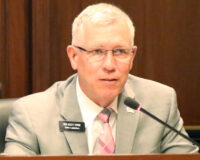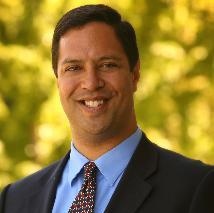The House Education Committee voted Thursday to remove references to climate change and human impact on the environment from a new set of science standards.
With Superintendent of Public Instruction Sherri Ybarra’s blessing, committee members adopted a proposed slate of new science standards, after first rejecting five paragraphs that reference rising global temperatures and climate change.

Rep. Scott Syme, R-Caldwell, pushed the committee to reject the climate change language, arguing that the standards did not teach “both sides of the debate.”
Ybarra told Syme she could live with the changes, and said rewritten language could refer to either “the rise or the fall” of global temperatures.
Last year, legislators quietly rejected a different slate of proposed standards after a legislator also raised objections to language addressing human impact on the environment.
In response, the State Department of Education, a State Board of Education subcommittee and a team of some of the state’s most awarded science teachers spent 2016 collecting public feedback and drafting new standards.
Educators and citizens vetted the standards during public hearings and Gov. Butch Otter and the State Board then enacted them temporarily earlier this year.
“I really didn’t want to scrap everything they had done, just some,” Syme said. “Actually most of these (rejected paragraphs) deal with three areas and didn’t seem to me to present both sides of the picture.”
Even though the committee rejected climate change language, Rep. Ryan Kerby, R-New Plymouth, said local school officials would be free to develop their own curriculum addressing climate change. Kerby is the retired superintendent of his local school district.
After the meeting, Syme said he worked closely with Kerby to analyze the standards. Syme said he decided that he needed to take a closer look, after receiving many emails “from all over the state” urging him to pass the standards. Syme suspects the emails were a coordinated effort from an organization, but he did not say which group.
“What the curriculum that was written presented was mainly the adverse impacts and didn’t discuss what positive impact they can have on the environment,” Syme said. “What I’m looking for is to have the public say, ‘Yeah, maybe we can see there was a one-sided presentation on the negative side and, hey, let’s talk about this and both sides of the issue.’”
In a voice vote, the committee’s three Democrats voted against striking climate change language. Eleven Republicans appeared to support the language change. Rep. Paul Amador, R-Coeur d’Alene, favored the standards as originally written. An roll call vote was not called.

Rep. John McCrostie, D-Garden City, said he voted against the wording change because it had not been vetted by the public or approved by Otter or the State Board.
“At the end of the day, I feel like I could accept that, I could live with the motion that is on the floor right now in taking those five (paragraphs) out,” said McCrostie, a public school music teacher. “As a matter of principle, I believe (the original standards) were well vetted.”
Amador said he supported the original standards because he wants to remove politics from education policy and trusted the Idaho teachers who developed the standards.
“While I appreciate teaching both sides, I think this was a very transparent process where we relied on our highly qualified educators,” Amador said.
Several committee members stressed to Ybarra the importance of continuing to gather public feedback on the standards. However, about 30 people were in the audience Thursday, and weren’t given a chance to testify. The committee accepted public testimony earlier in the week.
Technically, the committee approved a temporary rule including the new science standards. When the Legislature adjourns, the new standards will take effect, without the climate change language. Then, SDE and State Board officials will develop a permanent rule.
Based on Ybarra’s comments and committee debate Thursday, it appears likely state officials will draft new language to replace the references to climate change. Legislators would review the standards again in 2018.
Here are the full text of the five paragraphs that were removed from the new science standards:
ESS3-MS-5. Ask questions to clarify evidence of the factors that have caused the rise in global temperatures over the past century.
- Further Explanation: Examples of factors include human activities (such as fossil fuel combustion, cement production, and agricultural activity) and natural processes (such as changes in incoming solar radiation or volcanic activity). Examples of evidence can include tables, graphs, and maps of global and regional temperatures, atmospheric levels of gases such as carbon dioxide and methane, and the rates of human activities. Emphasis is on the major role that human activities play in causing the rise in global temperatures.
ESS3.C: Human Impacts on Earth Systems
- Human activities have altered the biosphere, sometimes damaging or destroying natural habitats and causing the extinction of other species. But changes to Earth’s environments can have different impacts (negative and positive) for different living things.(ESS3-MS-3)
- Typically as human populations and per-capita consumption of natural resources increase, so do the negative impacts on Earth unless the activities and technologies involved are engineered otherwise. (ESS3-MS-3, ESS3-MS-4)
- Human activities (such as the release of greenhouse gases from the burning of fossil fuel combustion) are major factors in the current rise in Earth’s mean surface temperature. Other natural activities (such as volcanic activity) are also contributors to changing global temperatures. Reducing the level of climate change and reducing human vulnerability to whatever climate changes do occur depend on the understanding of climate science, engineering capabilities, and other kinds of knowledge, such as understanding of human behavior and on applying that knowledge wisely in decisions and activities. (ESS3-MS-5)
LS4.D: Biodiversity and Humans
- Biodiversity is increased by the formation of new species (speciation) and decreased by the loss of species (extinction). (LS2-HS-7)
- Humans depend on the living world for the resources and other benefits provided by biodiversity. But human activity is also having adverse impacts on biodiversity through overpopulation, overexploitation, habitat destruction, pollution, introduction of invasive species, and climate change. Thus sustaining biodiversity so that ecosystem functioning and productivity are maintained is essential to supporting and enhancing life on Earth. Sustaining biodiversity also aids humanity by preserving landscapes of recreational or inspirational value. (LS2-HS-7, LS4-HS-6.)
LS4.D: Biodiversity and Humans
- Humans depend on the living world for the resources and other benefits provided by biodiversity. But human activity is also having adverse impacts on biodiversity through overpopulation, overexploitation, habitat destruction, pollution, introduction of invasive species, and climate change. Thus sustaining biodiversity so that ecosystem functioning and productivity are maintained is essential to supporting and enhancing life on Earth. Sustaining biodiversity also aids humanity by preserving landscapes of recreational or inspirational value. (LS4-HS-6, LS2-HS-7.)
ESS2 .D: Weather and Climate
- Current models predict that, although future regional climate changes will be complex and varied, average global temperatures will continue to rise. The outcomes predicted by global climate models strongly depend on the amounts of human-generated greenhouse gases added to the atmosphere each year and by the ways in which these gases are absorbed by the ocean and biosphere. (ESS3-HS-6)
